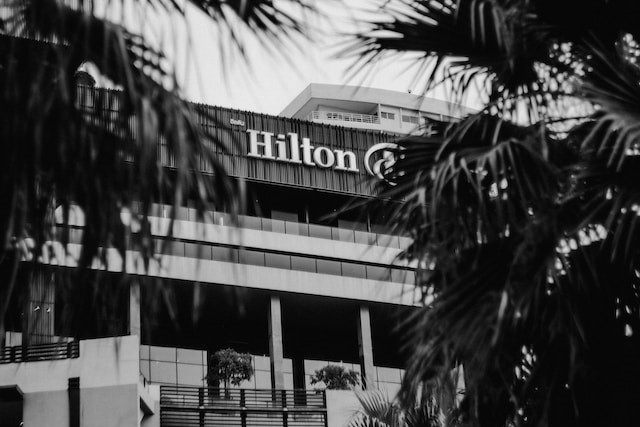Before we dive deep into the PESTEL analysis, let’s get the business overview of Hilton. Hilton Worldwide Holdings Inc. (commonly referred to as Hilton) is a leading global hospitality company managing a diverse portfolio of hotel brands and services.
Founded in 1919 by Conrad Hilton, the company has become one of the largest hotel chains in the world. As of 2022, Hilton has 7,165 properties comprising 1,127,430 rooms in 123 countries and territories.
Business Segments:
- Owned and Leased Hotels: Hilton owns, leases, or has stakes in several hotels under various brand names. These properties generate revenue through room rentals, food and beverage sales, and other ancillary services. As of December 31, 2022, the segment included 52 hotels totaling 17,612 rooms.
- Management and Franchise: Hilton also manages and franchises hotels on behalf of third-party owners. The company earns revenue through management, franchise, and incentive fees based on hotel performance in this segment. As of December 31, 2022, the segment includes 778 managed hotels and 6,255 franchised hotels with 1,096,115 total rooms.
Hilton’s diversified portfolio comprises various brands catering to different market segments, from luxury to economy. Some of the key Hilton brands include:
- Luxury Brands: Waldorf Astoria Hotels & Resorts, Conrad Hotels & Resorts, and LXR Hotels & Resorts.
- Upper Upscale Brands: Hilton Hotels & Resorts, Curio Collection by Hilton, and Tapestry Collection by Hilton.
- Upscale Brands: DoubleTree by Hilton, Embassy Suites by Hilton, and Hilton Garden Inn.
- Upper Midscale Brands: Hampton by Hilton, Tru by Hilton, and Homewood Suites by Hilton.
- Midscale Brands: Home2 Suites by Hilton and Motto by Hilton.
Besides hotel operations, Hilton has a customer loyalty program called Hilton Honors, which offers members exclusive benefits and rewards, such as room upgrades, free Wi-Fi, and points redeemed for hotel stays, experiences, or merchandise.
Business Model: Hilton primarily derives its revenues from the following sources:
- Franchise and licensing fees: Represents fees earned in connection with the licensing of one of the brands and fees from licensing agreements to use our IP.
- Base and incentive management fees: Represents fees earned in connection with the management of hotels. Hilton’s fees generally consist of a base fee, typically based on a percentage of the hotel’s monthly gross revenue, and an incentive fee, generally based on a percentage of the hotel’s operating profits.
- Owned and leased hotels: Represents revenues derived from the operations of consolidated owned and leased hotels, including hotel room sales, accommodations sold in conjunction with other services, food, and beverage sales, and other ancillary goods and services.
- Other revenues: Represents revenues generated by the incidental support of hotel operations for owned, leased, managed, and franchised hotels, including our purchasing operations and other operating income.
Financial Performance: In 2022, Hilton generated ~$8.7 billion in revenue and $2.1 billion in operating income.
Here is the PESTEL analysis of Hilton Hotels
A PESTEL analysis is a strategic management framework used to examine the external macro-environmental factors that can impact an organization or industry. The acronym PESTEL stands for:
- Political factors: Relate to government policies, regulations, political stability, and other political forces that may impact the business environment.
- Economic factors: Deal with economic conditions and trends affecting an organization’s operations, profitability, and growth.
- Sociocultural factors: Relate to social and cultural aspects that may influence consumer preferences, lifestyles, demographics, and market trends.
- Technological factors: Deal with developing and applying new technologies, innovations, and trends that can impact an industry or organization.
- Environmental factors: Relate to ecological and environmental concerns that may affect an organization’s operations and decision-making.
- Legal factors: Refer to the laws and regulations that govern businesses and industries.
In this article, we will do a PESTEL Analysis of Hilton.
PESTEL Analysis Framework: Explained with Examples
Political
- Government Stability: Political stability in a country affects the hospitality industry significantly. Hilton would prefer to operate in countries with stable political systems since it reduces the risk of damage to property, harm to guests, or disruptions in operations.
- International Relations: Diplomatic relations between countries can influence the ease of doing business. For instance, strained relationships might lead to restrictions or bans, affecting Hilton’s potential or existing operations.
- Tourism Policies: Governments may promote or demote tourism for various reasons, such as cultural preservation or economic strategies. Hilton would benefit from policies promoting tourism.
- Trade Tariffs and Regulations: These affect the cost of importing goods, such as hotel amenities or food items. Increased tariffs could raise Hilton’s operational costs.
- Safety and Security Regulations: Hilton Hotels need to abide by the security standards set by local, national, or international bodies. Hilton might need to invest more in security measures in regions with heightened security concerns.
- Infrastructure Development: Government investments in infrastructure, like roads, airports, and public transport, can have a positive effect on the hospitality industry. Improved accessibility can attract more guests to Hilton properties.
- Regulations on Foreign Direct Investment (FDI): Some countries might have restrictions or favorable policies on FDI, influencing Hilton’s decision to invest in properties or enter joint ventures.
- Political Events: Events such as international summits, sports events, or cultural festivals often require substantial accommodation facilities. Hilton could benefit from these events if they happen in their operating regions.
- Public-Private Partnerships: In some regions, governments might collaborate with private entities like Hilton to promote tourism or improve infrastructure.
- Geopolitical Tensions: In areas with conflicts, terrorism, or geopolitical tensions, the hotel industry is often negatively affected due to reduced tourism and potential threats to guests and property.
Economic
- Global Economic Trends: A global recession or economic downturn can reduce travel for leisure and business travel, leading to reduced hotel bookings. On the other hand, economic booms can lead to increased travel and higher room rates.
- Exchange Rates: Hilton operates internationally, exposing it to currency fluctuations. A strong dollar might make traveling to other countries more affordable for Americans but could also make it more expensive for foreigners to visit the U.S., potentially impacting Hilton’s revenues in different regions.
- Inflation Rates: High inflation can increase the operational costs for Hilton, from salaries to supplies, which might lead to increased room rates for customers.
- Interest Rates: Changes in interest rates can affect Hilton’s ability to secure loans for expansion or operations. Low-interest rates might encourage investments in new properties or renovations, while high rates could deter such initiatives.
- Disposable Income of Consumers: The amount of disposable income available to consumers in different markets can influence their ability to travel and stay in hotels. Rising disposable incomes generally lead to increased travel and hotel stays.
- Employment Rates: High employment rates can increase business travel, conferences, and vacations, benefiting Hilton. On the other hand, high unemployment can have the opposite effect.
- Economic Health of Key Source Markets: Hilton’s revenue might depend on travelers from specific countries. The economic health of these key source markets is crucial, as a recession in one of these markets can lead to a decrease in travelers from that region.
- Real Estate Market Dynamics: Hilton is also influenced by real estate prices as a hotel chain. Expanding or establishing a new presence might be cost-prohibitive in areas where real estate prices are skyrocketing. Conversely, there could be expansion opportunities in markets where real estate is undervalued.
Sociocultural
- Travel Culture: The propensity of people from certain cultures or countries to travel, either for leisure or business, can significantly impact the hotel industry. A culture that values travel and leisure will likely produce more guests for hotels like Hilton.
- Demographic Shifts: Changes in population structures, such as aging populations or rising middle classes in certain regions, can influence travel patterns and hotel preferences.
- Health and Wellness Trends: A growing emphasis on health, wellness, and holistic experiences might push Hilton to offer health-focused amenities, spa services, fitness centers, and nutritious food options.
- Culinary Preferences: As culinary tourism grows and travelers seek authentic local experiences, Hilton might adapt by offering regional cuisines or unique dining experiences.
- Environmental and Ethical Consciousness: Modern travelers are becoming more environmentally conscious. There’s a growing preference for sustainable and eco-friendly hotels. Hilton might need to incorporate green practices and sustainable architecture and support local communities to appeal to these travelers.
- Cultural Sensitivities and Local Traditions: Operating in various countries means that Hilton needs to be aware of and respect local customs, traditions, and religious practices. This could relate to room design, food options, or hotel activities.
- Lifestyle Trends: Digital nomadism, workation (combining work and vacation), and long-term stays are emerging trends. Hotels like Hilton might adapt by offering packages or facilities catering to such travelers.
- Influence of Social Media and Online Reviews: Influencers, travel bloggers, and online reviews significantly shape travel decisions. Positive reviews and collaborations can significantly benefit Hilton, while negative reviews can harm its reputation.
- Family Dynamics: In some cultures, family travel involving extended family members is more prevalent, which might influence room configurations or the types of facilities offered.
- Local Festivals and Events: Being aware of local cultural events can help Hilton in terms of promotions, offers, and packages to attract guests during these periods.
Technological
- Digital Booking Platforms: The rise of online travel agencies (OTAs) like Booking.com, Expedia, and Agoda has transformed how guests book hotel rooms. Hilton must ensure its visibility on these platforms while promoting its direct booking channels.
- Mobile Integration: With the proliferation of smartphones, guests expect functionalities like mobile check-in/out, mobile room keys, or even using their phones to control room amenities.
- Artificial Intelligence (AI) & Chatbots: AI can enhance guest experience through personalized recommendations. Meanwhile, chatbots can offer 24/7 customer support, answering queries and handling basic tasks.
- Data Analytics: Leveraging data analytics can help Hilton better understand guest preferences, optimize pricing strategies, and effectively tailor marketing campaigns.
- Internet of Things (IoT): Implementing IoT in rooms allows for smart rooms where lighting, temperature, and entertainment can be controlled and personalized according to guest preferences.
- Virtual Reality (VR) & Augmented Reality (AR): VR can be used for virtual hotel tours before booking. AR might enhance the guest experience, e.g., interactive hotel maps or augmented dining experiences.
- Connectivity: High-speed internet access is almost a basic expectation for hotel guests today, whether for business or leisure purposes.
- Property Management Systems (PMS): Advanced PMS can streamline various hotel operations, from room bookings to billing, ensuring efficiency and reducing errors.
- Robotics: Some hotels have started using robots to deliver room service or handle luggage, enhance efficiency, and offer a unique experience.
Environmental
- Sustainability Initiatives: Modern travelers are becoming increasingly conscious of their environmental footprint. There is a growing preference for hotels that prioritize sustainability. Hilton may need to adopt green practices such as energy-efficient lighting, water-saving appliances, and waste-reduction measures to appeal to these travelers.
- Regulations and Legislation: Many countries impose stricter environmental regulations to combat climate change. This could relate to emissions, waste management, energy usage, or materials sourcing. Hilton would need to be compliant with these regulations across its global operations.
- Climate Change: Climate change can have direct and indirect impacts. Direct impacts include potential damage to hotel properties due to rising sea levels or extreme weather events. Indirectly, changing weather patterns might affect tourist inflows in certain destinations, which were previously popular during specific seasons.
- Eco-friendly Building Standards: Implementing sustainable architecture and building practices, such as green rooftops, rainwater harvesting, and using sustainable construction materials, can reduce a hotel’s environmental impact and cater to eco-conscious travelers.
- Local Biodiversity: Hotels must ensure their operations do not harm local flora and fauna, especially in ecologically sensitive areas. This might influence where Hilton decides to build and how they operate in certain locations.
- Waste Management: Efficient waste management practices, including recycling and composting, reduce environmental impact and can also save costs in the long run.
- Local Resource Scarcity: In regions where resources like water are scarce, Hilton would need to adopt measures to reduce consumption, implement water recycling, or even source water sustainably.
- Carbon Footprint Reduction: Measures like adopting renewable energy sources, energy-efficient appliances, and even offering carbon offset options for guests can help in reducing the overall carbon footprint of the hotel’s operations.
- Supply Chain Management: Sourcing products locally reduces transportation emissions and supports local economies. Hilton might look into sustainable food, amenities, and other goods sourcing.
- Local Community Engagement: Ensuring that hotel operations don’t harm the local environment and, instead, contribute positively, perhaps through community clean-up or tree-planting initiatives, can foster good relationships with local communities.
Legal
- Licensing and Registration: Operating in multiple countries requires Hilton to adhere to various local licensing requirements, zoning laws, and regulations specific to the hospitality industry.
- Labor Laws: Hilton needs to be compliant with the labor laws of each country, which can encompass aspects like minimum wage, working hours, benefits, and workers’ rights. Non-compliance can lead to significant penalties and harm the brand’s reputation.
- Health and Safety Regulations: Hotels must adhere to strict health and safety standards, ensuring the well-being of both guests and staff. This includes fire safety, food safety, hygiene standards, and structural safety.
- Data Protection and Privacy: With the global emphasis on data protection, such as the GDPR in Europe, Hilton must ensure that its data collection, storage, and usage practices align with international and local data protection laws.
- Consumer Protection Laws: These laws ensure that consumers’ rights are protected. Hilton must ensure transparent pricing, promotional offers clarity, and quality standards adherence.
- Taxation Laws: With properties worldwide, Hilton must navigate the complex web of local taxation laws, including property taxes, sales taxes, and tourist taxes.
- Real Estate and Property Laws: Since Hilton often invests in real estate to build or renovate its properties, understanding property rights, land use regulations, and local zoning laws is crucial.
- Intellectual Property Rights: Protecting the brand’s trademarks, patents (for any proprietary technology they might employ), and copyrights (for promotional materials, in-house publications, etc.) across different jurisdictions is vital.
- Anti-discrimination and Equal Opportunity Laws: To ensure fairness in hiring and service provision, Hilton needs to comply with laws that prohibit discrimination based on race, gender, religion, disability, and other protected categories.
- Competition and Anti-trust Laws: These laws prevent businesses from engaging in practices that can hinder fair competition. Hilton must ensure its pricing strategies, partnerships, and business practices don’t violate these regulations.
- Contract Laws: Given the multitude of agreements Hilton would enter into (with suppliers, partners, franchisees, etc.), understanding and adhering to contract laws in different jurisdictions is paramount.











